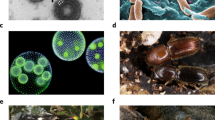Summary
The evolution of altruism does not necessarily require an extreme amount of kinship. This point is illustrated with an analysis of altruistic behavior in the Trematode parasite Dicrocoelium dendriticum, which apparently can evolve even when the parasites of the host are derived from as many as five different parents.
Similar content being viewed by others
References
Hohorst, W., Graefe, G.: Ameisen — obligatorische Zwischenwirte des Lanzettegels (Dicrocoelium dentriticum). Naturwissenschaften 48, 229–230 (1961)
James, B.L., Bowers, E.A.: Reproduction in the daughter sporocyst of Cercaria bucephalopsis haimaena. Parasitology 57, 607–625 (1967)
Schneider, G., Hohorst, W.: Wanderung der Metacercarien des Lanzett-Egels in Ameisen. Naturwissenschaften 58, 327–328 (1971)
Szidat, L.: Über eine ungewöhnliche Form parthenogenetischer Vermehrung bei Metacercarien einer Gymnopallus-Art aus Mytilus platensis, Gymnopallus australis n. sp. des Südatlantik. Z. Parasitenk. 22, 196–213 (1962)
Wickler, W.: Evolution-oriented ethology, kin selection, and altruistic parasites. Z. Tierpsychol. 42, 205–214 (1976)
Wilson, D.S.: Structured demes and the evolution of group-advantageous traits. Amer. Nat. 111, 157–185 (1977)
Author information
Authors and Affiliations
Rights and permissions
About this article
Cite this article
Wilson, D.S. How nepotistic is the brain worm?. Behav Ecol Sociobiol 2, 421–425 (1977). https://doi.org/10.1007/BF00299510
Received:
Issue Date:
DOI: https://doi.org/10.1007/BF00299510




